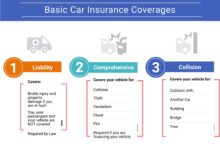Car Insurance Florida: Meeting Minimum Coverage Requirements And More
Car insurance Florida is not just about meeting minimum coverage requirements; it’s a vital aspect of protecting yourself on the road. From understanding the state’s regulations to finding affordable options, this guide covers everything you need to know.
Crafting a Healthy Meal Plan
Having a well-balanced meal plan offers numerous benefits for overall health and well-being. It ensures that your body receives essential nutrients, maintains energy levels throughout the day, and supports weight management goals.
Examples of Nutrient-Rich Foods
Include a variety of the following foods in your healthy meal plan:
- Fruits and vegetables: rich in vitamins, minerals, and antioxidants
- Whole grains: provide fiber and sustained energy
- Lean proteins: essential for muscle growth and repair
- Healthy fats: found in nuts, seeds, and avocados for heart health
- Dairy or dairy alternatives: a source of calcium and vitamin D
Importance of Portion Control
Controlling portion sizes is key in maintaining a healthy weight and preventing overeating. Use measuring cups, plates, or your hand as a guide to portion out food groups properly.
Tips for Efficient Meal Prep
Preparing meals in advance can save time and ensure you have healthy options readily available. Consider the following tips for efficient meal prepping:
- Plan your meals for the week ahead of time
- Cook in batches to save time and minimize cooking throughout the week
- Invest in quality storage containers to keep food fresh
- Include a variety of flavors and textures to keep meals interesting
- Pre-cut fruits and vegetables for easy snacks or meal additions
Minimum Car Insurance Requirements in Florida
In Florida, drivers are required to carry a minimum amount of car insurance to legally operate a vehicle on the road. These requirements are in place to ensure that drivers have some level of financial protection in case of an accident.
Comparison of Minimum Requirements
Florida is a no-fault state, which means that drivers are required to have Personal Injury Protection (PIP) coverage. The minimum requirements in Florida include:
– $10,000 in Personal Injury Protection (PIP)
– $10,000 in Property Damage Liability (PDL)
When compared to other states, Florida’s minimum requirements are unique due to its no-fault system. Other states may have different types of coverage or higher minimum limits.
Consequences of Not Meeting Minimum Requirements
If a driver in Florida fails to meet the minimum insurance requirements, they may face consequences such as fines, license suspension, or even legal action. Driving without proper insurance can put both the driver and others at financial risk in case of an accident.
Types of Coverage in Florida’s Minimum Requirements
| Coverage Type | Minimum Required Limit |
|---|---|
| Personal Injury Protection (PIP) | $10,000 |
| Property Damage Liability (PDL) | $10,000 |
Insufficient Coverage Scenarios
In situations where the minimum coverage may not be sufficient, such as a serious accident involving multiple vehicles or injuries, the costs can quickly exceed the limits set by Florida’s minimum requirements. This can leave drivers financially responsible for any additional expenses, which can be significant.
Finding Affordable Insurance Options
To find affordable insurance options that meet or exceed Florida’s minimum requirements, drivers can shop around and compare quotes from different insurance companies. They can also consider bundling policies, raising deductibles, or qualifying for discounts to lower their insurance premiums.
Factors Affecting Car Insurance Rates in Florida
When it comes to car insurance rates in Florida, several factors come into play that can significantly impact how much you pay for coverage. Understanding these factors can help you make informed decisions and potentially lower your insurance premiums.
Demographics, driving record, and location all play a crucial role in determining car insurance rates in Florida. Let’s delve into each of these factors to see how they influence the cost of insurance.
Demographics
Demographics such as age, gender, marital status, and even credit score can affect car insurance rates in Florida. Younger drivers, male drivers, and individuals with a poor credit history tend to pay higher premiums due to the perceived higher risk associated with these groups.
- Younger drivers under the age of 25 often face higher insurance rates as they are considered more inexperienced and prone to accidents.
- Male drivers, statistically shown to be involved in more accidents than female drivers, may also have higher premiums.
- Individuals with a lower credit score may be charged more for car insurance as insurance companies may view them as higher risk.
Driving Record
Your driving record is a significant factor that insurance companies consider when determining your rates. A clean driving record with no accidents or traffic violations typically results in lower premiums, while a history of accidents, speeding tickets, or DUIs can lead to higher rates.
- Accidents and traffic violations on your record signal to insurance companies that you may be a riskier driver, resulting in increased premiums.
- Driving defensively, obeying traffic laws, and maintaining a clean driving record can help keep your insurance rates lower.
Location
Where you live in Florida can also impact your car insurance rates. Urban areas with higher population density and increased traffic congestion tend to have higher insurance premiums compared to rural areas.
- Areas with high rates of vehicle theft or vandalism may also lead to higher insurance costs.
- The frequency of accidents in your area and the overall safety of the neighborhood can influence how much you pay for car insurance.
Top Car Insurance Companies in Florida
When it comes to car insurance in Florida, there are several top insurance companies that offer a range of services to meet the needs of drivers in the state. Understanding the options available from these leading providers can help you make an informed decision when choosing the right coverage for your vehicle.
State Farm
State Farm is one of the largest car insurance companies in Florida, offering a variety of coverage options including liability, collision, and comprehensive insurance. They are known for their competitive rates and excellent customer service, making them a popular choice among drivers in the state.
GEICO
GEICO is another top insurance company in Florida, known for their affordable rates and easy online claims process. They offer a wide range of coverage options and discounts for policyholders, making them a popular choice for drivers looking to save money on their car insurance.
Allstate
Allstate is a well-known insurance provider in Florida, offering customizable coverage options to meet the needs of different drivers. They provide features like accident forgiveness and new car replacement, along with 24/7 customer support to assist policyholders whenever needed.
Progressive
Progressive is a leading car insurance company in Florida, known for their innovative tools and competitive rates. They offer a variety of coverage options, including snapshot discounts based on driving habits, making them a popular choice for tech-savvy drivers.
Table Comparing Top Car Insurance Companies in Florida
| Insurance Company | Coverage Options | Premiums | Customer Service Ratings | Unique Features/Discounts |
|---|---|---|---|---|
| State Farm | Liability, Collision, Comprehensive | Competitive Rates | Excellent | Various Discount Options |
| GEICO | Wide Range of Coverage | Affordable | Good | Online Claims Process |
| Allstate | Customizable Coverage | Varies | 24/7 Support | Accident Forgiveness |
| Progressive | Snapshot Discounts | Competitive Rates | Innovative Tools | Tech-Savvy Options |
Customer Review for State Farm: “I have been with State Farm for years and their customer service is top-notch. They always go above and beyond to help me with any issues I have.”
Customer Review for GEICO: “Switching to GEICO saved me a ton of money on my car insurance. The online process was so easy and their rates are unbeatable!”
Customer Review for Allstate: “Allstate has been great in providing me with the coverage I need. Their accident forgiveness feature has been a lifesaver for me.”
Customer Review for Progressive: “I love using Progressive’s app to track my driving habits and get discounts. Their rates are fair and the service is excellent.”
Visual representation such as a chart or graph can illustrate the market share of each top car insurance company in Florida, showcasing their popularity among drivers in the state.
Understanding No-Fault Insurance in Florida
No-fault insurance is a type of auto insurance coverage that is mandatory for drivers in the state of Florida. This system is designed to provide coverage for medical expenses and lost wages regardless of who is at fault in an accident.
How No-Fault Insurance Works
In Florida, under the no-fault insurance system, each driver’s insurance company will cover their own medical expenses and lost wages up to the policy limits, regardless of who caused the accident. This means that drivers can quickly receive compensation for their injuries without having to go through a lengthy legal process to determine fault.
Benefits of No-Fault Insurance
– Streamlined claims process: With no-fault insurance, drivers can file a claim with their own insurance company without having to prove fault, speeding up the process of receiving compensation.
– Prompt medical treatment: No-fault insurance allows drivers to quickly access medical care for their injuries, reducing the risk of long-term complications.
– Reduced legal costs: Since fault does not need to be established in order to receive benefits, the need for costly legal battles is minimized.
Requirements for Filing a Claim
To file a claim under the no-fault insurance system in Florida, drivers must report the accident to their insurance company within a certain timeframe, typically 14 days. They must also seek medical treatment from a healthcare provider approved by their insurance company in order to qualify for benefits.
Comprehensive vs. Collision Coverage in Florida
When it comes to car insurance in Florida, understanding the differences between comprehensive and collision coverage is essential. These two types of coverage offer different benefits and limitations that can impact your financial protection in the event of an accident or other covered incident.
Comprehensive coverage, also known as “other than collision” coverage, provides protection for damage to your vehicle that is not caused by a collision. This can include theft, vandalism, natural disasters, and more. On the other hand, collision coverage specifically covers damage to your vehicle resulting from a collision with another vehicle or object.
Benefits and Limitations of Comprehensive and Collision Coverage
- Comprehensive Coverage:
- Benefits:
- Protection against non-collision related damages
- Coverage for theft and vandalism
- Peace of mind for unpredictable incidents
- Limitations:
- Higher premiums compared to collision coverage
- Deductibles may apply
- Not required by law in Florida
- Benefits:
- Collision Coverage:
- Benefits:
- Protection for collision-related damages
- Coverage for at-fault accidents
- Helps repair or replace your vehicle
- Limitations:
- Does not cover non-collision incidents
- May not cover the full value of your vehicle
- Deductibles may apply
- Benefits:
Examples of Situations Where Each Type of Coverage Would be Beneficial
- Comprehensive Coverage:
- Example 1: Your car is stolen from a parking lot
- Example 2: A tree falls on your vehicle during a storm
- Collision Coverage:
- Example 1: You rear-end another vehicle at a stoplight
- Example 2: You hit a guardrail on a slippery road
Tips for Finding Affordable Car Insurance in Florida
Finding affordable car insurance in Florida can be a challenging task, but with the right strategies and knowledge, you can secure a policy that fits your budget without compromising on coverage. Here are some tips to help you find affordable car insurance rates in Florida:
Compare Quotes from Different Insurance Providers
- Get quotes from multiple insurance companies to compare prices and coverage options.
- Consider both local and national insurance providers to find the best rates.
- Look for online comparison tools that can help you easily compare quotes from different insurers.
Leverage Discounts and Incentives
- Ask about available discounts, such as safe driver discounts, multi-policy discounts, and good student discounts.
- Consider taking a defensive driving course to qualify for additional discounts.
- Check if you qualify for any incentives, such as pay-as-you-drive programs or usage-based insurance.
Uninsured Motorist Coverage in Florida
Uninsured motorist coverage in Florida is a crucial component of car insurance policies that protects you in case you are involved in an accident with a driver who does not have insurance or does not have enough insurance to cover the damages.
Significance of Uninsured Motorist Coverage
- Provides financial protection: Uninsured motorist coverage helps cover medical expenses and damages to your vehicle if you are hit by an uninsured driver.
- Peace of mind: Knowing you have coverage in place in case of an accident with an uninsured driver can give you peace of mind while on the road.
Legal Requirements and Options
- In Florida, uninsured motorist coverage is not mandatory, but insurance companies are required to offer it to policyholders.
- You have the option to purchase uninsured motorist coverage with limits that match your liability coverage, or you can choose lower limits if desired.
Car Insurance Laws and Regulations in Florida
Car insurance laws and regulations in Florida are governed by specific statutes that outline the requirements for drivers in the state. These laws are designed to ensure that all drivers have the necessary coverage to protect themselves and others in the event of an accident.
Minimum Car Insurance Requirements in Florida
In Florida, drivers are required to carry a minimum of $10,000 in personal injury protection (PIP) and $10,000 in property damage liability (PDL) coverage. This coverage helps pay for medical expenses and property damage resulting from a car accident.
Comparison with Other States
When compared to other states, Florida’s minimum car insurance requirements are relatively low. Some states require higher levels of coverage, such as bodily injury liability (BIL) insurance, which is not mandatory in Florida.
Types of Car Insurance Coverage in Florida
- Personal Injury Protection (PIP): Covers medical expenses for you and your passengers in the event of an accident.
- Property Damage Liability (PDL): Pays for damage you cause to someone else’s property in a car accident.
- Bodily Injury Liability (BIL): Optional coverage that pays for injuries to others if you are at fault in an accident.
Filing a Car Insurance Claim in Florida
The process of filing a car insurance claim in Florida involves contacting your insurance company, providing relevant information about the accident, and cooperating with the claims adjuster. The insurance company will investigate the claim and determine the coverage and compensation.
A real case study involving car insurance fraud in Florida:
In a recent case of car insurance fraud in Florida, a driver was caught submitting false medical claims following a minor fender bender. The driver was charged with insurance fraud, fined heavily, and had their insurance policy cancelled. This case highlights the serious consequences of committing fraud in the realm of car insurance.
Steps to Take After a Car Accident in Florida
After being involved in a car accident in Florida, it’s crucial to follow specific steps to ensure your safety and protect your interests. Here is a step-by-step guide on what to do after a car accident in Florida.
Document the Accident and Exchange Information
- Check for injuries: First and foremost, check yourself and others for any injuries. Call 911 immediately if anyone requires medical assistance.
- Move to a safe location: If possible, move your vehicle to a safe location to avoid further accidents.
- Exchange information: Exchange contact and insurance information with the other driver(s) involved in the accident. Include names, phone numbers, addresses, insurance policy numbers, and vehicle information.
- Document the scene: Take photos of the accident scene, including vehicle damage, road conditions, traffic signs, and any relevant details. This documentation can be crucial for insurance claims and legal purposes.
File a Claim with Your Insurance Provider
- Contact your insurance company: Notify your insurance provider about the accident as soon as possible. Provide them with all the necessary information, including the details of the accident and the other party involved.
- Complete the claims process: Your insurance company will guide you through the claims process, which may involve filling out forms, providing documentation, and cooperating with their investigation.
- Follow up on your claim: Stay in touch with your insurance company to track the progress of your claim. Be prepared to answer any additional questions or provide further details if needed.
High-Risk Car Insurance in Florida
High-risk car insurance in Florida is a type of coverage specifically designed for drivers who are considered high-risk by insurance companies. Being classified as high-risk can be a result of various factors such as a history of accidents, traffic violations, DUI convictions, or poor credit scores. These drivers are perceived as more likely to file claims, leading to higher premiums.
Options for Obtaining Car Insurance as a High-Risk Driver
For high-risk drivers in Florida, there are specialized insurance companies that cater to this specific demographic. These companies offer coverage options tailored to the needs of high-risk drivers, albeit at higher premiums. Additionally, some standard insurance companies may also provide coverage for high-risk drivers, although at a higher cost.
Tips for Improving Driving Habits and Reducing High-Risk Classification
To reduce the risk of being labeled as high-risk, drivers in Florida can focus on improving their driving habits. This includes following traffic rules, avoiding speeding, maintaining a clean driving record, attending defensive driving courses, and addressing any issues that may have contributed to their high-risk classification.
Coverage Differences Between Standard Car Insurance and High-Risk Car Insurance
| Coverage | Standard Car Insurance | High-Risk Car Insurance |
|---|---|---|
| Liability | Yes | Yes |
| Collision | Yes | Yes |
| Comprehensive | Yes | Yes |
| Uninsured Motorist | Yes | Yes |
Reputable Insurance Companies Offering High-Risk Car Insurance in Florida
– ABC Insurance
– XYZ Insurance
– DEF Insurance
How to Request Quotes for High-Risk Car Insurance Online
1. Visit the websites of insurance companies that offer high-risk car insurance in Florida.
2. Fill out the online quote request form with accurate information.
3. Provide details about your driving history, including any accidents or violations.
4. Submit the form and wait for the insurance companies to provide you with quotes.
Driving without insurance in Florida can result in fines, license suspension, vehicle impoundment, and legal penalties. It is essential to have the necessary coverage to protect yourself and others on the road.
Technology and Car Insurance Trends in Florida
Technology plays a significant role in shaping car insurance trends in Florida. From telematics to artificial intelligence (AI), advancements in technology are revolutionizing the way insurance companies assess risk, determine premiums, and interact with policyholders.
Telematics and Usage-Based Insurance
Telematics, which involves the use of devices to monitor driving behavior, has led to the rise of usage-based insurance models in Florida. By tracking factors such as speed, braking, and mileage, insurers can offer personalized premiums based on actual driving habits. This has the potential to reward safe drivers with lower rates while encouraging better behaviors on the road.
- Usage-based insurance models rely on data collected through telematics devices installed in vehicles to calculate premiums.
- Policyholders who demonstrate safe driving practices may benefit from discounts and incentives under these programs.
- Telematics can provide valuable insights into driver behavior, leading to improved road safety and reduced accident rates.
Mobile Apps and Real-Time Feedback
Mobile apps have become a valuable tool for insurers to engage with policyholders and provide real-time feedback on their driving habits. Through these apps, drivers can access information about their coverage, track their driving performance, and receive tips on how to improve their behaviors behind the wheel.
- Mobile apps offer convenience and accessibility for policyholders to manage their insurance policies on-the-go.
- Real-time feedback can help drivers identify areas for improvement, ultimately leading to safer driving practices.
- Insurers can use data from mobile apps to tailor policies and premiums based on individual driving behaviors.
Blockchain Technology and Insurance Claims
Blockchain technology is being explored in Florida to enhance the verification of insurance claims for accuracy and transparency. By creating secure and tamper-proof records of transactions, blockchain can streamline the claims process, reduce fraud, and improve trust between insurers and policyholders.
- Blockchain technology offers a decentralized and secure platform for storing and sharing insurance-related information.
- Smart contracts enabled by blockchain can automate claims processing, leading to faster payouts and reduced administrative costs.
- The transparency of blockchain can help prevent disputes and ensure that claims are settled fairly and efficiently.
Autonomous Vehicles and Insurance Policies
The emergence of autonomous vehicles poses both opportunities and challenges for car insurance in Florida. While self-driving cars have the potential to reduce accidents caused by human error, they also raise questions about liability, coverage, and the role of insurers in a driverless future.
- Insurers may need to adapt their coverage models to account for the unique risks and responsibilities associated with autonomous vehicles.
- The shift towards autonomous driving technology could lead to changes in insurance premiums, claims processes, and coverage options.
- Regulatory frameworks and industry standards will need to evolve to address the legal and ethical implications of insuring autonomous vehicles.
Additional Coverage Options in Florida
When it comes to car insurance in Florida, drivers have the option to go beyond the minimum requirements and add additional coverage to their policies for extra protection and peace of mind.
Comprehensive Coverage
Comprehensive coverage helps protect your vehicle from damages not caused by a collision, such as theft, vandalism, or natural disasters. It can be beneficial for drivers in Florida who want full coverage for their vehicles.
- Benefits of Comprehensive Coverage:
- Protection against non-collision related damages
- Pays for repairs or replacement of your vehicle
- Provides peace of mind in various scenarios
Rental Car Coverage
Rental car coverage ensures you have a rental vehicle while your car is being repaired after an accident. This option can be useful for drivers who rely on their vehicles for daily transportation.
- Benefits of Rental Car Coverage:
- Continued access to transportation after an accident
- No need to worry about rental costs out of pocket
- Convenience during the repair process
Gap Insurance
Gap insurance covers the difference between what you owe on your car loan or lease and the actual cash value of your vehicle if it’s totaled in an accident. This coverage is ideal for drivers with newer vehicles or high loan amounts.
- Benefits of Gap Insurance:
- Financial protection in case of a total loss
- Pays off your remaining loan balance
- Avoids financial burden in a challenging situation
| Insurance Type | Coverage Limits | Benefits |
|---|---|---|
| Comprehensive Coverage | Varies based on policy | Protection against non-collision damages |
| Rental Car Coverage | Up to a certain daily limit | Continued access to transportation |
| Gap Insurance | Varies based on the loan amount | Financial protection in case of a total loss |
Final Conclusion
With the information provided, you are now equipped to navigate the world of car insurance in Florida confidently. Remember, being well-informed is the best way to ensure you have the coverage you need when you need it most.



